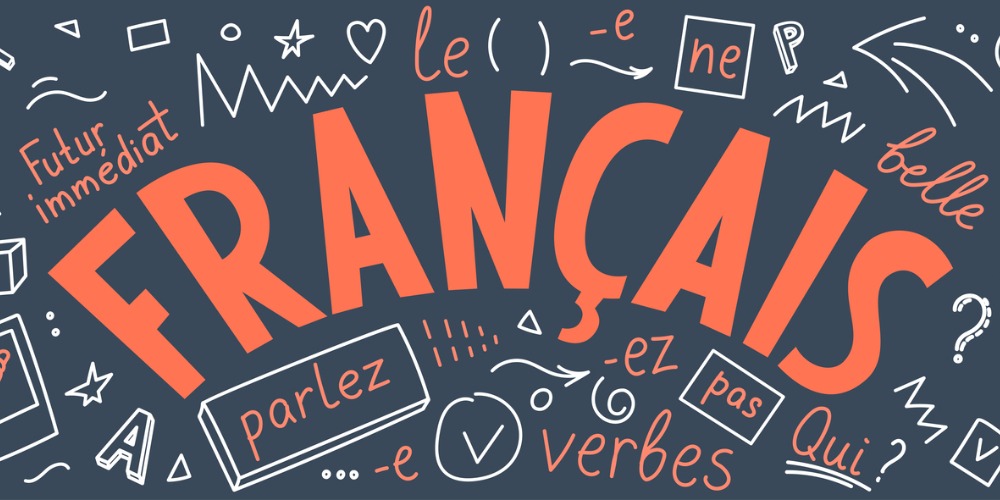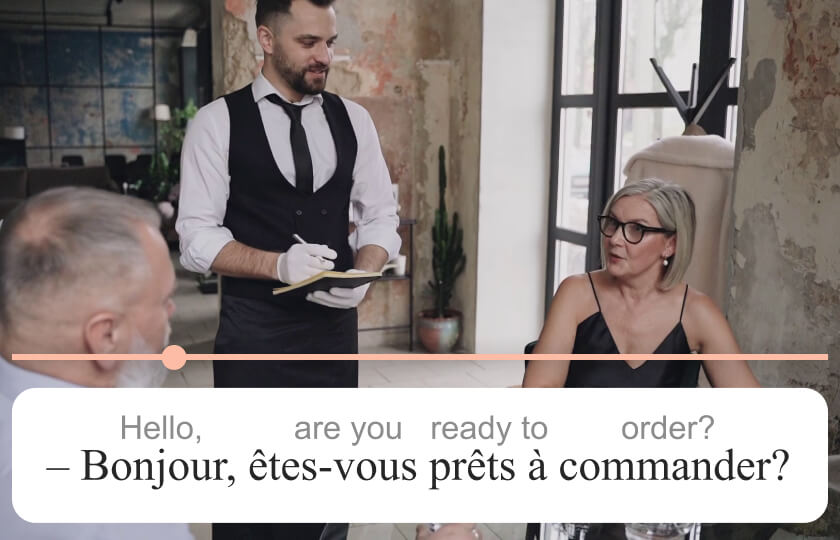
French is one of the most popular languages in the world, spoken by over 275 million people. It’s everywhere, from the chic cafes of Paris to the bustling markets of Africa. As a key player in international circles, French is essential in organizations like the UN and the EU. Plus, it’s your ticket to a world of amazing literature, cinema, and music.
Let’s dive into the world of learning French – where ‘r’s are rolled, and every sentence sounds like you’re planning a mysterious rendezvous.
1. Foundations of learning French
Understanding basic grammar
French grammar might seem daunting at first, but it’s the framework that will support your growing language skills. Let’s break it down into manageable parts.
Gender and articles: In French, every noun is either masculine or feminine, and this determines the articles (the equivalents of ‘a’ and ‘the’ in English). For masculine nouns, use “un” (a) and “le” (the); for feminine nouns, it’s “une” and “la”. But remember, there’s also “l'” used before vowels, regardless of gender, and “des” and “les” for plural nouns.
Verbs and conjugation: French verbs change form based on the subject and tense. For instance, the verb “parler” (to speak) becomes “je parle” (I speak), “tu parles” (you speak), and so on.
Adjectives and agreement: Adjectives in French must agree in gender and number with the noun they describe. A tall man is “un homme grand”, but a tall woman is “une femme grande”.
Word order: Typically, French sentences follow the Subject-Verb-Object structure, but sometimes adjectives and other elements can move around for emphasis or style.
Here are some resources to help you navigate the intricacies of French grammar. “Easy French Step-by-Step” by Myrna Bell Rochester provides a clear and gradual introduction to French grammar. Apps like Lilata, Duolingo, and Babbel provide interactive and gamified exercises that are perfect for beginners. Lawless French offers more detailed explanations suited for advancing your understanding.
Essential vocabulary for beginners
Vocabulary is the building block of language proficiency. Begin with basic, everyday words and phrases. Focus on terms related to common situations like greetings, ordering food, shopping, and asking for directions. Practical vocabulary not only boosts your confidence but also makes your learning relevant and enjoyable.
Flashcards, vocabulary apps, and sticky notes around your home can be great tools for memorization. Also, try to incorporate new words into your daily conversations, even if it’s just talking to yourself. Repetition is key!
Use Anki and Memrise for customizable flashcards. Watch Learn French with Vincent for extensive vocabulary lessons. Use FrenchPod101 for vocabulary lists and audio examples.
Pronunciation and phonetics
French pronunciation can be tricky with its nasal sounds and silent letters, but it’s also one of the most charming aspects of the language. Start by familiarizing yourself with the French alphabet and the sounds of each letter.
Listen to native speakers as much as possible. This could be through songs, movies, or language exchange meetups. Try to mimic the sounds and rhythms of their speech. Don’t worry if you don’t get it right immediately – pronunciation is about training your ear and your vocal muscles, which takes time and practice.
Practicing pronunciation also improves your listening skills, as you become more attuned to the nuances of the language. Consider recording yourself speaking French and compare it to native speakers to self-assess and improve.
Forvo offers pronunciation of words by native speakers. Rosetta Stone uses speech recognition to improve pronunciation. The “French Sounds” YouTube Channels provides detailed pronunciation guides.
2. Immersive learning techniques
Immersive learning is an approach that takes you beyond textbooks and classrooms, bringing the French language into your everyday life. It’s about engaging with the language in a way that mimics natural language acquisition. Here’s how you can immerse yourself in French, making your learning journey more effective.
Language immersion at home
Creating a French-speaking environment in your home is simpler than you might think. Label everyday items in your house with their French names. This small step helps integrate new vocabulary into your daily life without overwhelming you. Another effective strategy is to designate certain times of the day for exclusively thinking and speaking in French. It may be challenging at first, but it’s an excellent way to transition from translating in your head to thinking directly in French.
Using media to enhance language skills
Incorporating French media into your routine is a practical way to expose yourself to the language. Watching French films or TV shows, even with subtitles, helps you get used to the sounds and rhythms of spoken French. Similarly, listening to French music can be both enjoyable and educational. Try to understand the lyrics and sing along. This not only improves your pronunciation but also exposes you to different aspects of French culture and slang.
Reading books and newspapers
Starting with children’s books or simple stories in French is an excellent way for beginners to ease into the language. For instance, classics like “Le Petit Prince” by Antoine de Saint-Exupéry or “Le Petit Nicolas” series by René Goscinny are great choices, as they use simple language yet offer engaging stories. As you progress, consider moving on to French newspapers like “Le Monde” or “Le Figaro” for more advanced reading and to get familiar with current vocabulary. Magazines such as “Paris Match” or “Le Point” can also provide a mix of cultural, political, and entertainment news, helping you to expand your vocabulary.
Immersive learning is about weaving French into the fabric of your daily life. It’s a method that encourages active engagement with the language in a context that’s meaningful to you. By adopting these techniques, you’ll find that your ability to understand and communicate in French improves in a more natural and enjoyable way. Keep your learning diverse, engaging, and integrated into your daily routine for the best results.
3. Practical application and conversation
The true essence of learning a language lies in its practical use – engaging in conversations, expressing thoughts, and understanding others. Let’s see how you can apply your French skills in real-life situations, enhancing both your fluency and confidence.
Daily practice tips
Consistent practice is key to mastering French. Try to incorporate the language into your daily routine. For instance, you could start your day by reading a French article or listening to a French podcast. When you encounter new words, jot them down and try to use them in sentences throughout your day. Engage in self-talk in French or narrate your activities to practice sentence formation and fluency.
Participating in language exchange programs
Language exchange programs offer a fantastic opportunity to practice French with native speakers. These programs pair you with French speakers who are learning your native language, allowing for a mutually beneficial learning experience. You can find language exchange partners through online platforms like Tandem and HelloTalk, or local community groups. Regular conversations with native speakers will not only improve your speaking and listening skills but also provide insights into French culture and colloquialisms.
Attending French conversation clubs
Many cities have French conversation clubs where learners of all levels come together to practice speaking. These clubs often meet in cafes or libraries and provide a relaxed environment to use your French. Participating in these clubs can help you overcome the fear of speaking and offer a supportive community of fellow language learners. They are also great places to pick up practical phrases and slang that are not typically found in textbooks.
Applying your French skills in practical settings is crucial for language development. It transforms theoretical knowledge into active skill, making your learning journey more fulfilling and effective. Engage in daily practices, seek out conversational partners, and immerse yourself in environments where French is actively used. Remember, every conversation, no matter how small, is a step forward in your language learning journey. Keep practicing, stay persistent, and watch your French skills flourish.
4. Technology for learning French
Language learning apps
Language learning apps offer structured lessons, interactive exercises, and personalized learning experiences. Apps like Lilata, Duolingo, Babbel, and Rosetta Stone are designed to make learning French engaging and fun. They include gamified elements, keeping you motivated as you earn points or badges for your progress. These apps are excellent for building vocabulary, improving grammar, and practicing pronunciation.
Online courses and webinars
The internet is full of online courses that cater to various aspects of French learning. For instance, Udemy and FIAF offer courses ranging from beginner to advanced levels. These courses are created by experienced educators and linguists, providing high-quality content. Additionally, webinars and live sessions conducted by native speakers can offer real-time interaction and clarification of doubts, adding a human element to digital learning.
Social media
Social media can be a valuable tool in your learning arsenal. Following French language pages, joining French learning groups on Facebook, or engaging with French content creators on YouTube can immerse you in the language. Instagram and Twitter are also great platforms for quick, daily interactions with French text. You can follow French news outlets, celebrities, or cultural pages to get regular updates in French, allowing you to see the language as it is used in contemporary settings.
5. Overcoming challenges in language learning
Strategies for retaining and remembering vocabulary
One of the most common challenges in language learning is remembering new vocabulary. To combat this, try incorporating new words into your daily conversations, even if it’s just speaking to yourself. Creating sentences with new words helps in contextualizing them, making them easier to remember. Another effective method is to use mnemonic devices or associate words with images or stories.
Coping with frustration and staying motivated
It’s normal to feel frustrated when progress seems slow or when faced with complex aspects of the language. When this happens, it’s important to remind yourself of your initial motivation for learning French. Setting small, achievable goals can also keep you motivated. Celebrate these small victories to maintain enthusiasm. Additionally, vary your learning routine to keep it fresh and engaging. If you find yourself stuck in a rut, switch up your study materials or try a new learning method.
Adjusting to different accents and speeds of speaking
French is spoken in various accents and speeds around the world. To adapt to this diversity, expose yourself to different French-speaking media, including films, music, and podcasts from different regions. Listening to a wide range of French speakers will train your ear to understand various accents and speech patterns. Practice regularly, and gradually increase the speed of the spoken French you listen to. This will improve your listening comprehension skills over time.
Overcoming these challenges is a critical part of your language learning journey. Remember that every learner faces obstacles, but persistence and a positive attitude can significantly enhance your ability to learn and enjoy the French language. Embrace the challenges as opportunities to grow and deepen your understanding of both the language and the rich cultures it represents. Keep pushing forward, and you’ll find that the rewards are well worth the effort.
6. Conclusion
Summarizing key learning strategies
The journey to French fluency is unique for each individual, but certain key strategies are universally beneficial. Consistent practice, immersive learning, practical application, embracing technology, and leveraging community resources are all crucial elements. Remember, language learning is a process that involves patience, persistence, and a willingness to make mistakes and learn from them.
The journey ahead
Language mastery is an ongoing process, filled with continuous learning and practice. As you advance, challenge yourself with more complex texts, engage in conversations with native speakers, and immerse yourself in French media and culture. Look for opportunities to use French in your daily life, whether it’s through travel, work, or social interactions.
Above all, keep your passion for the language and its culture alive. Learning French is not just about memorizing rules and vocabulary; it’s about connecting with a whole new world of experiences, ideas, and people. Embrace every opportunity to use and improve your French, and enjoy the journey of becoming a part of the global Francophone community.
Congratulations on taking this step towards mastering the French language. Bonne chance et bon voyage on your continuing adventure in French learning!
7. Resources
Mobile and web apps
- Lilata – Simple, fun, and effective French lessons for beginners.
- Duolingo – Gamified language learning platform, good for beginners.
- Babbel – Offers comprehensive lessons on French grammar and vocabulary.
- Rosetta Stone – Immersive language learning with an emphasis on pronunciation.
- Memrise – Uses mnemonic techniques and spaced repetition.
- Busuu – Offers practice with native speakers.
- Anki – A flashcard app that’s great for vocabulary building.
Textbooks and workbooks
- Easy French Step-by-Step – Great for beginners.
- Living Language French – Complete edition from beginner through advanced courses.
- Complete French Grammar – Excellent for honing grammar skills.
Audio courses
- Pimsleur French – Focuses on oral language skills.
- Coffee Break French – Podcast-style lessons that are engaging and easy to follow.
- FrenchPod101 – Wide range of audio lessons, from beginner to advanced levels.
YouTube channels
- Easy French – Street interviews with French subtitles.
- Learn French with Alexa – Friendly and engaging teaching.
- FrenchPod101 – Variety of videos covering different aspects of the language.
Websites for practice and immersion
- TV5Monde – Provides French learning through news, cinema, and cultural content.
- RFI Savoirs – Learn French through news stories.
- Le Point du FLE – A hub for French learning resources and exercises.
Language exchange and conversation practice
- Tandem – Connects you with native speakers for language exchange.
- HelloTalk – Language exchange app focusing on text and voice messages.
- ConversationExchange – Find conversation partners for face-to-face or online practice.
Additional resources
If you’re interested in more ways and tools to learn French, check out All Language Resources. This site offers detailed reviews to help people choose the best resources for learning languages.

